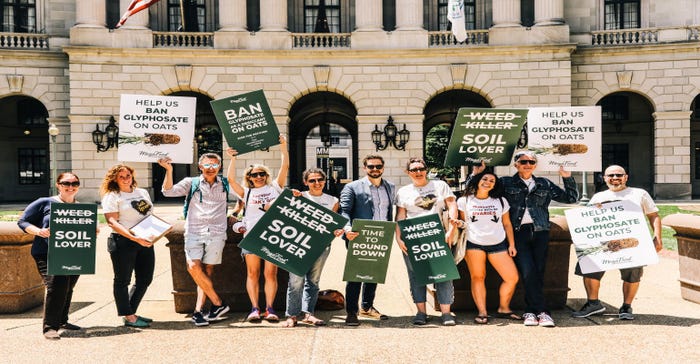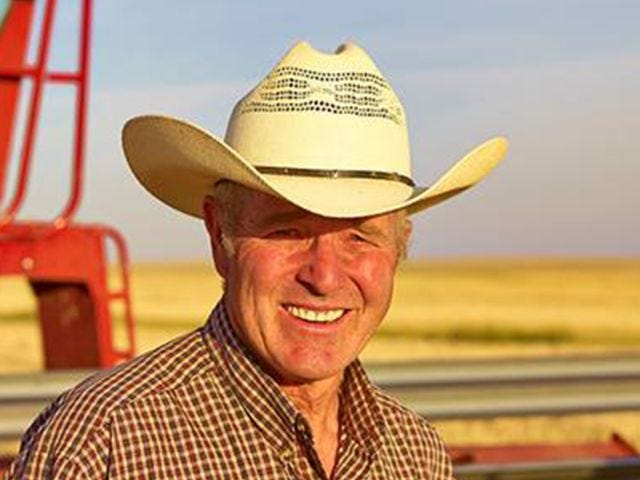MegaFood in May hosted a rally in the nation's capital over a 2018 petition to EPA to reduce the tolerance level of glyphosate in oats and explicitly prohibit its use as a pre-harvest desiccant.
.png?width=850&auto=webp&quality=95&format=jpg&disable=upscale)
Glyphosate Girl was in the nation’s capital during the May 23 rally. So was a Montana farmer, as was the owner of a nutrition store in Utah.
The reason: To drive interest in a 2018 petition, requesting the Environmental Protection Agency (EPA) reduce the tolerance level of glyphosate in oats and explicitly prohibit its use as a pre-harvest desiccant.
Those in favor of the petition pitched the issue as one of protecting the public health, especially children who are more vulnerable to the toxic effects of chemicals like glyphosate. The chemical has been registered as a pesticide in the U.S. since 1974 and is commonly used as an herbicide to control weeds.
“Pesticides that are linked to cancer don’t belong in foods that are consistently consumed by children,” said Alexis Temkin, a toxicologist with the Environmental Working Group (EWG), a public interest organization, in an interview. “And the prohibition of the use of glyphosate as a pre-harvest desiccant on oats is a major step in preventing that exposure and potential health harm.”
Several groups joined EWG in the petition filed with EPA, including, among others, Ben & Jerry’s Homemade Inc., MegaFood, Nature’s Path Foods Inc. and Stonyfield Farm Inc. The petition specifically requested EPA reduce the tolerance level of glyphosate in oats from 30 parts per million (ppm) to .1 ppm and mandate glyphosate-containing product labels explicitly bar the use of glyphosate as a pre-harvest desiccant—a practice used to dry crops prior to harvest.
Bethany Davis is director of advocacy and government relations at MegaFood, a vitamin and supplement company whose slogan is “fresh from farm to tablet.” She discussed her company’s support for the petition.
“We’re interested in this because our company cares a lot about the health of the planet and the health of people,” she said in an interview. “We wanted to partner with companies that are like-minded.”
MegaFood organized a May 23 rally at Freedom Plaza in Washington. In all, about 100 people—many of them activists—floated in and out during the event, Davis recalled.
Jared St. Clair is among those who flew into the nation’s capital. He owns Vitality Nutrition in Bountiful, Utah, and won a contest that MegaFood held for its independent retail partners to draw support for EWG’s petition. The contest, Davis noted, was “overwhelmingly positive and well received.”
In an interview, St. Clair explained he’s been long opposed to glyphosate, which he characterized as a “neurotoxin.”
“It seems like we always jump to cancer and heart disease and things that kill everybody in America,” he said. “If it gets to that level, we say, ‘Oh, my gosh, we probably ought to stop this.’ But short of that, we allow a lot of things to just go on even though they’re making us sicker and sicker.”

Montana farmer Bob Quinn also attended the rally in Washington. He owns a farm in Big Sandy that has been in the family since the early 20th century. Quinn, an organic farmer who started leasing out his farm in 2018, said in an interview that he has never sprayed glyphosate on his crops.
Yet minute amounts of the herbicide were detected on his crops in 2017 and 2018, he said. Quinn suspects glyphosate is coming to his farm through rainfall, and he said he intends to take samples throughout the year beginning with winter snowfall to analyze possible patterns.
Glyphosate is “everywhere and contaminating everything,” said Quinn, who expressed support for “some kind of restrictions on its use.”
Quinn, whose farm grows barley, wheat and other crops, said the herbicide is more commonly used as a pre-harvest desiccant in Canada. But he said it’s also used in the United States as a pre-harvest desiccant for lentils, for example.
He referenced third-party research suggesting glyphosate is tied to such maladies as cancer.
“I think it’s time we really start looking at what we’re doing to our land and our health and our food, and taking it more seriously,” the Montana farmer said, “and not just look at yields and ease of production.”

St. Clair and Quinn are among tens of thousands of people who have expressed support for the request by EWG, MegaFood and other companies to reduce the tolerance level of glyphosate in oats and explicitly prohibit its use as a pre-harvest desiccant.
Davis said about 82,000 people signed a form letter in support of the petition. She acknowledged it remains to be seen how much weight that will hold at EPA, whose duties include, among other obligations, review of chemicals for safety.
EPA will address the petition, an agency spokesperson said, as part of its ongoing registration review of glyphosate.
“We know that there’s support in the House” of Representatives for the petition, Davis said, citing a bill (“Keep our Food Safe from Glyphosate Act”) introduced in March by Rep. Rosa DeLauro (D-Calif.) “We know there’s support from consumers” and brands.
Don’t count Bayer among the supporters. It owns Monsanto, the developer of Roundup, a popular glyphosate-based herbicide.
“There is no reliable scientific evidence that glyphosate use results in levels of residue that pose health problems for consumers,” Bayer said in an emailed statement via a spokesman. “All glyphosate levels referenced in the EWG’s petition are far below the limits established by the EPA to protect human health.”
In 2018, EWG looked for glyphosate in oatmeal or oat-based cereal, granola and snack bar products. Of the 45 samples tested, all but two tested positive for glyphosate, according to the public interest group. One of the breakfast cereals tested contained 2,837 ppb of glyphosate, nearly 18 times higher than a children’s health benchmark set by EWG.
Even at that level, Bayer countered, an adult would need to consume “81.5 pounds of the oat breakfast cereal every day for the rest of their life to reach” EPA’s “strict limits.”
Many people, nonetheless, are worried about the long-term effects of the herbicide. Judy Robinson of Marlboro—a small town in southern Vermont—is worried about her family’s exposure to glyphosate and other chemicals. A few months ago, she and her daughter volunteered to participate in a study that tested urine samples for glyphosate.
Robinson had virtually no glyphosate in her body. By contrast, her 14-year-old daughter, Tess, tested positive for the herbicide with nearly 2 ppb in her urine—the second-highest result among the volunteer families.
“It’s very concerning that her levels would be so high during critical stages of development,” said Robinson, the executive director of Coming Clean, a collaborative aimed to reduce sources of chemical exposure. In an interview, she expressed concern chemicals such as glyphosate “may be linked to devastating health effects.”

Robinson didn’t find the results entirely surprising. While she said she has been gluten-free for about the last decade and consumes a nearly exclusively organic diet with fresh and whole foods, Robinson said her “daughter loves gluten.” Among Tess’s favorite foods: bread, crackers, cookies, Goldfish crackers and wheat-based products.
“She will eat those three times a day—every day—and asks for them probably five times a day,” Robinson reflected. But after getting back the test results, Tess drastically curtailed her consumption of non-organic and high-processed foods, her mom said.
“We’re not all the healthiest that we could possibly be, and we’re not all only exposed to this one chemical,” Robinson said. “It’s a chemical soup out there, and consumers are just trying to keep up.”
The Center for Environmental Health (CEH), a non-profit organization in Oakland, California fighting against the use of toxic chemicals, said it conducted the glyphosate tests through an independent laboratory. Asked whether the two highest test results in the study posed any health concerns, senior scientist Carolina Cox of CEH responded she is unaware of studies that have examined glyphosate in children and health outcomes.
“That said, there is research showing glyphosate is a hormone-disrupting chemical,” Cox added in an email. “Many hormone-disrupting chemicals cause problems at very low exposures.”
She referenced, for example, a 13-week pilot study that examined whether exposure to glyphosate-based herbicides affect the development and endocrine system across different life stages in rats. In the study published in the journal Environmental Health, researchers wrote, “Hormonal status imbalances were more pronounced in Roundup-treated rats after prolonged exposure.”
Critics of glyphosate have cited risk of cancer associated with the herbicide, an issue being litigated in the courts.
“Americans’ widespread exposure to glyphosate is of growing concern, particularly in the context of children’s health, because of the potential risk of cancer,” EWG warned in its 2018 petition to EPA. “Yet, EPA deviated from its own established risk assessment guidelines and took the position that glyphosate is ‘unlikely to cause cancer.' As a result, the high food tolerance levels of glyphosate remain set without an evaluation of carcinogenicity as an endpoint.”
The tolerance level for glyphosate in oat grain increased from 0.1 ppm in 1993 to 30 ppm in 2008 following a petition by Monsanto, according to the 2018 petition. The latter level is consistent with the maximum residue level set for cereal grains by Codex Alimentarius, a collection of codes, guidelines and standards adopted by a body (Codex Alimentarius Commission) established jointly by the Food and Agricultural Organization (FAO) and World Health Organization (WHO), noted CropLife America in its response to EWG’s petition.
CropLife America represents companies that produce, sell and distribute crop protection and biotechnology products. In an April 2019 proposed interim decision, CropLife America noted, EPA evaluated glyphosate to determine if updates were necessary to current tolerance levels. The agency concluded “glyphosate is not likely to be carcinogenic to humans and therefore a quantitative cancer assessment was not conducted.”
EPA’s risk assessment of the herbicide, CropLife America added, is in line with other global regulatory authorities and international organizations, including, among others, the Australian Pesticide and Veterinary Medicines Authority, Canadian Pest Management Regulatory Authority and European Food Safety Authority (EFSA).
“In its petition, EWG fails to justify a departure from EPA’s well-established existing standards and the standards of virtually every regulatory body around the world,” asserted CropLife America, which requested EPA deny the petition.
The Joint Glyphosate Task Force, of which Bayer is a member, agreed with EPA’s conclusions. “The glyphosate residue levels claimed by EWG,” the task force wrote in its response to EWG’s petition, “are not even remotely close to any level of public health concern.”
EWG, however, cited a 2015 review by a subdivision of the WHO in which the International Agency for Research on Cancer (IARC) classified glyphosate as “probably carcinogenic to humans.” The classification was made under a category “used when there is limited evidence of carcinogenicity in humans and sufficient evidence of carcinogenicity in experimental animals.”
Subsequent “reviews have contradicted the conclusion,” including the EFSA and another subdivision of WHO that weighed in on carcinogenic risk to humans from exposure of glyphosate through the diet, EWG acknowledged.
But EWG and its co-petitioners noted human epidemiological studies suggest a link between glyphosate and non-Hodgkin lymphoma (NHL). For example, the petition referenced a 2014 study published in the International Journal of Environmental Research and Public Health that combined six epidemiological studies to examine the relationship between NHL and occupational exposure to agricultural pesticide active ingredients and chemical groups.
NHL is among the most common cancers in the United States, comprising about 4% of all cancers, according to the American Cancer Society.
Kelly Wardwell Ryerson—also known as “Glyphosate Girl”—observed and wrote about a trial last year in San Francisco brought against Monsanto by a man with NHL. She remembers going to court with a sign expecting protestors.
“There were no people and I walked right into the court room,” she said in an interview.
Ryerson describes herself on her website as an “independent public health advocate” who receives “no compensation from anyone for my work as Glyphosate Girl.” She holds a BA from Dartmouth College and an MBA from the Stanford Graduate School of Business, according to her website.

Ryerson said she used to be very sick before she realized she suffered from a severe intolerance to gluten. In March 2018, she attended a conference at the Columbia University Celiac Center in which a scientist depicted a picture of wheat grain. As Ryerson recalled, the scientist noted if you isolate gluten from the entire wheat grain, a person doesn’t experience the same type of inflammatory effect than if the entire wheat grain is eaten.
Ryerson recalled walking up to the microphone and asking a question.
“Have you thought about Roundup being on the wheat in the gluten grain, and maybe that’s the issue?” she asked. “And I was met with stares and blankness, and the physicians in the room turned around and they said, ‘There’s Roundup on our food?’”
[In 2016, glyphosate was applied to 33 percent of wheat acres in the U.S., according to the National Wheat Association, citing the analytics and research firm, GfK].
Ryerson cancelled her summer plans last year and sat through the San Francisco trial against Monsanto.
“The corruption is so disgusting,” she said.
In August 2018, the jury awarded $39 million in compensatory damages and $250 million in punitive damages to Lee Johnson, a former school groundskeeper who claimed Monsanto’s Roundup caused his cancer. The court later reduced the punitive damages amount to $39 million, and the case is on appeal.
“Based on the body of scientific evidence available and the assessments of regulatory authorities worldwide, we continue to believe that we have meritorious defenses and intend to defend ourselves vigorously in this and other product liability lawsuits relating to products containing glyphosate,” Bayer wrote in its annual report, commenting on the Johnson trial.
Bayer is mired in litigation over glyphosate. Approximately 18,400 plaintiffs have brought lawsuits, claiming personal injuries—including NHL and multiple myeloma—from exposure to glyphosate-based products made by Monsanto, Bayer disclosed in its half-year financial report for 2019.
In July, a California judge dramatically reduced a more than $2 billion jury verdict awarded to a couple who blamed Roundup for their cancer. The award was cut to $86.7 million, and while Bayer said the judge’s decision was a step in the right direction, it planned to file an appeal, Reuters reported. The jury in Alameda County, California awarded the two plaintiffs a total of $55 million in compensatory and $2 billion in punitive damages, according to Bayer’s half-year financial report.
Ryerson, who flew to Washington to attend the rally organized by MegaFood, said there is “immense public pressure” for EPA to closely reexamine glyphosate “without the bias of having industry influence their decision.”
“I personally don’t hold much hope that [EPA officials are] going to do the right thing and say what is actually in the evidence that [glyphosate] is a carcinogen,” she said, “but the more people become aware of the problem and the more pressure we can put on the EPA and government to not poison us … the better.”
About the Author(s)
You May Also Like






.png?width=800&auto=webp&quality=80&disable=upscale)